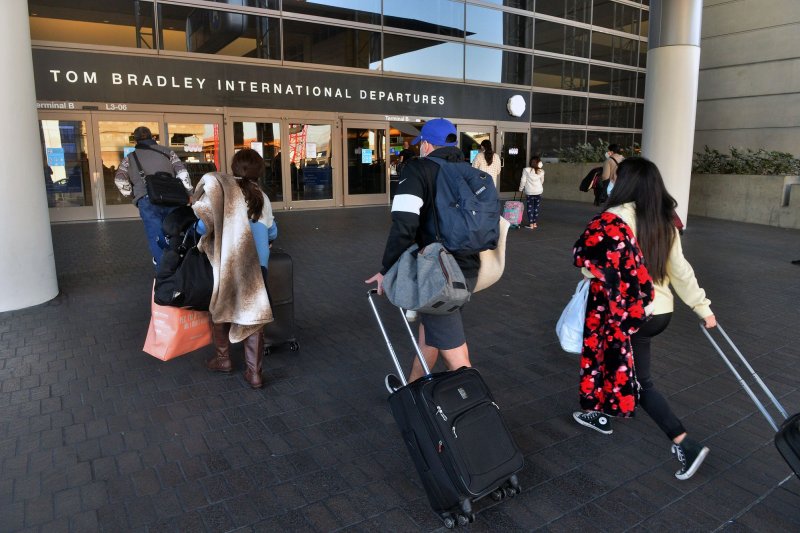1 of 5 | The United States on Friday afternoon joined the European Union, Britain, Japan, Israel and several others in blocking travel from South Africa and six other countries to prevent spread of the emerging COVID-19 Omicron variant. File Photo by Jim Ruymen/UPI |
License Photo
Nov. 26 (UPI) -- The World Health Organization on Friday designated an emerging strain of COVID-19, which originated in South Africa and has been named Omicron, as a "variant of concern."
Ahead of the WHO designation, both the European Union and United States announced plans to to block travel from the region in hopes of curtailing its spread, joining Britain's decision on Thursday and Friday decisions by France, Japan, Israel and Italy, among several others.
"This variant has a large number of mutations, some of which are concerning," the WHO's technical advisory group for COVID-19 said in a statement.
The agency called evidence it reviewed "indicative of a detrimental change" to the make up of COVID-19, and said it has a number of studies underway into the Omicron variant.
"Several labs have indicated that for one widely used PCR test, one of the three target genes is not detected... and this test can therefore be used as a marker for this variant, pending sequencing confirmation," the advisory group said.
"Using this approach, this variant has been detected at faster rates than previous surges of infection, suggesting that this variant may have a growth advantage," it added.
U.S. President Joe Biden said in a statement on Friday afternoon the country would restrict travel from South Africa and seven other countries starting next Monday.
"As a precautionary measure, until we have more information, I am ordering additional air travel restrictions... As we move forward, we will continue to be guided by what the science and my medical team advises," Biden said.
In Belgium on Friday announced it has confirmed a case of the dangerous new Omicron variant, after the EU had already announced it was working on new travel restrictions.
Marc Van Ranst, of the Rega Institute for Medical Research, said a sample from the patient was confirmed as the so-called B.1.1.529 variant in a traveler who returned from Egypt on Nov. 11. The patient first showed symptoms on Nov. 22.
Belgium had recently ramped up restrictions again to stop the spread of a new coronavirus wave, forcing employees to work from home four days a week through the middle of December.
European Commission President Ursula von der Leyen said early Friday the body will call for ending travel to southern African due to an outbreak of the new variant. Von der Leyen made the announcement on Twitter as European Union members are currently struggling with a new resurgence of COVID-19.
South Africa's National Institute for Communicable Diseases confirmed Thursday the new variant, which comes with 32 mutations and has been spreading in three different provinces there.
"The [European Commission] will propose, in close coordination with member states, to activate the emergency brake to stop air travel from the southern African region due to the variant of concern B.1.1.529," von der Leyen said on social media.
On Thursday, Britain banned travel from six African countries as a precaution against a new variant. Along with South Africa, Britain banned travel from Botswana, Eswatini, Lesotho, Namibia and Zimbabwe. It said travelers from these nations will face quarantine if they arrive.
Health experts have said that while data on the new variant, expected to be named for the Greek letter "Nu," is still developing, so far it is spreading at a faster pace than the Delta variant. Israel has already reported three suspected cases of the new variant in their country.
"This is the most significant variant we have encountered to date and urgent research is underway to learn more about its transmissibility, severity and vaccine-susceptibility," said Jenny Harries, chief executive of the British Health Security Agency, according to Politico.
In notes to both vaccinated and unvaccinated people in the United States, as well the rest of the world, Biden pushed for more people to get initial and booster shots, saying "this new variant should make clearer than ever why this pandemic will not end until we have global vaccinations."
Biden also called on nations meeting next week at a World Trade Organization ministerial meeting to "meet the U.S. challenge to waive intellectual property protection for COVID-19 vaccines, so these vaccines can be manufactured globally."















